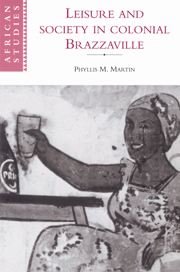Book contents
- Frontmatter
- Contents
- List of plates
- List of maps
- List of tables
- Acknowledgements
- List of abbreviations
- Introduction
- 1 An African crossroads, a frontier post and a colonial town, c. 1880–1915
- 2 Taking hold of the town, c. 1915–1960
- 3 The emergence of leisure
- 4 Football is king
- 5 About the town
- 6 Dressing well
- 7 High society
- Conclusion
- Notes
- Bibliography
- Index
- Titles in the series
5 - About the town
Published online by Cambridge University Press: 09 November 2009
- Frontmatter
- Contents
- List of plates
- List of maps
- List of tables
- Acknowledgements
- List of abbreviations
- Introduction
- 1 An African crossroads, a frontier post and a colonial town, c. 1880–1915
- 2 Taking hold of the town, c. 1915–1960
- 3 The emergence of leisure
- 4 Football is king
- 5 About the town
- 6 Dressing well
- 7 High society
- Conclusion
- Notes
- Bibliography
- Index
- Titles in the series
Summary
At the heart of town life was the entertainment of the streets, open squares, bars, beer-gardens, dance-halls and cinemas. Public amusement was often to be found out of doors, especially in the early days. By the 1920s, some entertainment took place in enclosed spaces, where the owners charged admission and served food and drinks. These establishments were usually associated with new forms of amusement such as films or partnered dancing. Pervading such recreational activities was an urban music which, like other aspects of leisure such as football and fashion, drew its inspiration from local and foreign sources in Bacongo and Poto-Poto. While rhythms, instruments and lyrics were brought from all over Central Africa, the civil servants from Guadeloupe and Martinique, the domestic servants and craftsmen from the coast, and the tirailleurs, artisans and clerks from West Africa all contributed to the evolution of new forms of entertainment. In this cosmopolitan environment, the celebrated ‘Congo music’ of the 1950s was born.
Such attractions helped ‘pull’ young migrants to the town, especially after the Second World War. As people came together to share common interests, they did so not only informally but also in more structured mutual-aid associations with strong recreational orientations. Although such groups existed early in the century, for they were institutions transported from rural areas and adapted to town life, they became significant in the later colonial period, when a larger number of people lived in the town for longer periods.
- Type
- Chapter
- Information
- Leisure and Society in Colonial Brazzaville , pp. 127 - 153Publisher: Cambridge University PressPrint publication year: 1996

